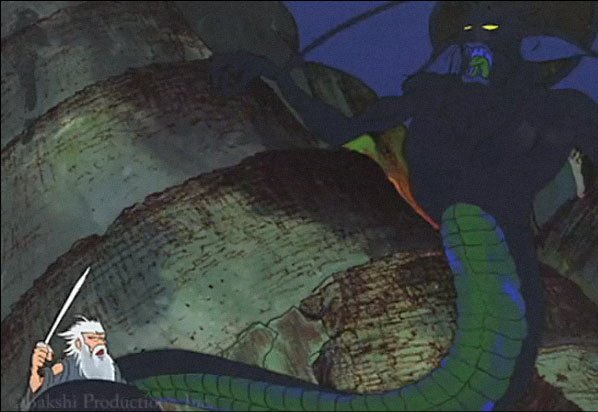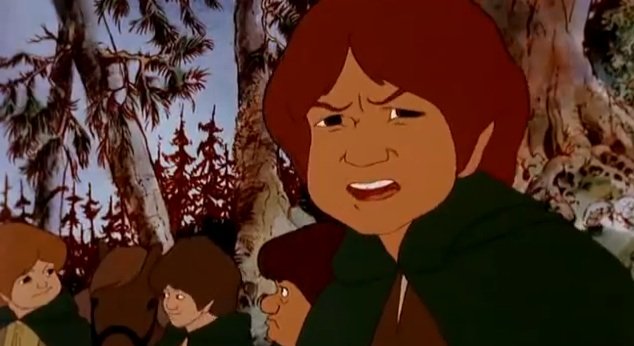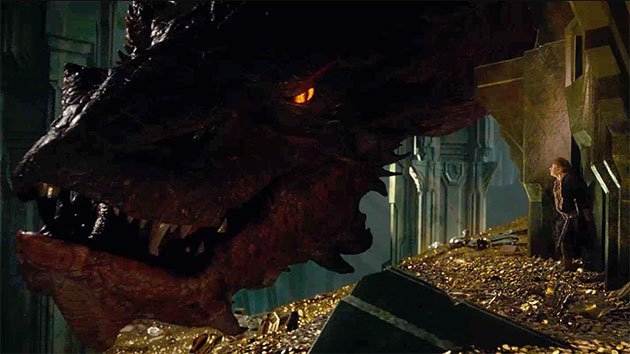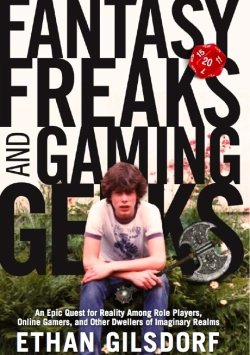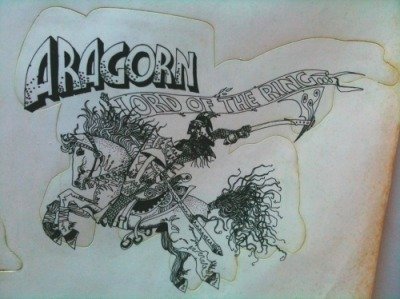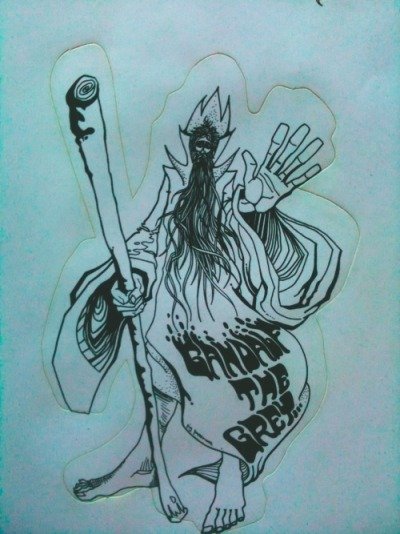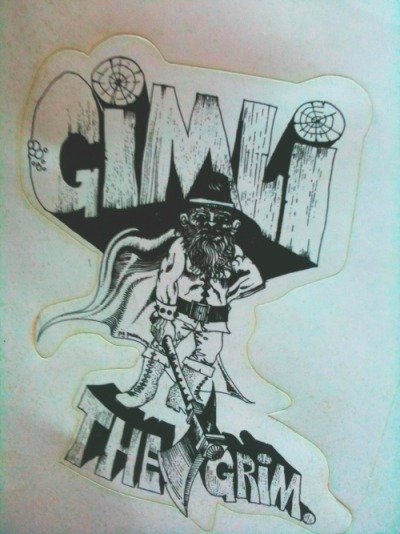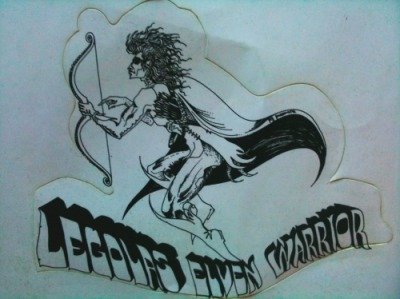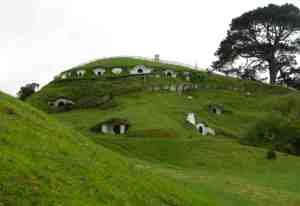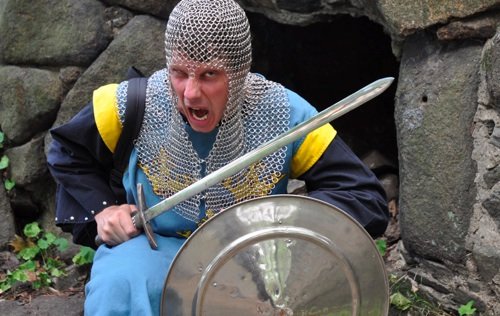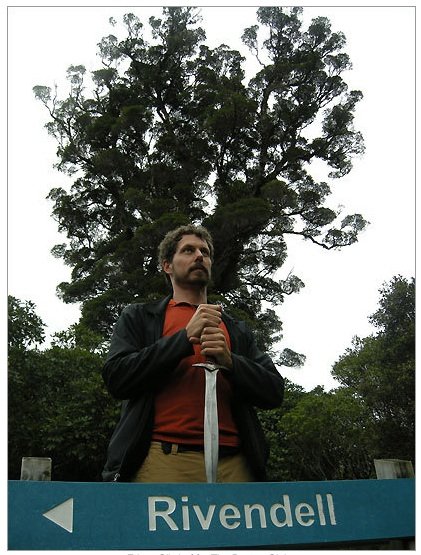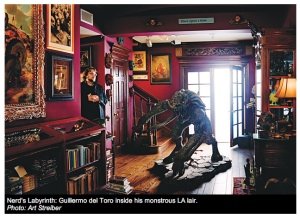
Sure, the Crusades are morally reprehensible—but when it comes to battling evil, out come the holy water, sacred texts, and "in the name of the father" pronouncements.
a review of Season of the Witch
by Ethan Gilsdorf
What ever happened to the risky Nicolas Cage who took on meaty roles like Adapation? Or, at least, the one who played sincere characters like Ben Sanderson in Leaving Las Vegas? Or, for that matter, the comic and goofy Nic of Raising Arizona?
Rather, and sadly, the actor of late has imprisoned himself within a cage lackluster supernatural action vehicles like Ghost Rider, The Sorcerer's Apprentice, The Wicker Man, Next, and Knowing. In each, Cage possesses some awesome power, prognosticates some doomed secret, or stumbles across a malevolence force. Cue the time portals, fiery circles, demonic possessions, pagan rituals and creepy flash-forwards of knowledge mere mortals ought not to know.
In Season of the Witch, the hangdog-faced Cage (now with greasy, shoulder-length locks) confronts another paranormal conundrum, this time set in medieval Europe. Disenchanted by his time in the armed services, aka the Crusades, Behmen (Cage) deserts the war with his longtime fighting, boozing and whoring buddy Felson, played by the primitive-looking Ron Perlman (Hellboy, Hellboy II). "You call this glories? Murdering women and children?" is Behmen's anti-war epiphany moment, after he takes part in a massacre at the fortified city Smyrna. The two pals wander back home from the Holy War and are captured for going AWOL.
Meanwhile, Europe has been engulfed by the Black Plague. A dying Cardinal (Christopher Lee, ghastly enough without makeup but here unrecognizable behind icky prosthetics of festering boils and tumors) offers them clemency if they agree to transport a suspected witch, a girl played by newcomer Claire Foy, who is blamed for causing the plague. Get she to a monastery. The monks there will know what to do. Right.
Ergo, the quest commences.
An A team is assembled: our two heroes, a monk named Debelzaq (Stephen Campbell Moore, from The Bank Job), a stoic knight (Ulrich Thomsen), an elfin altar boy who craves adventure (Robert Sheehan, from Cherrybomb) and Hagamar, a convicted thief (Stephen Graham from "Boardwalk Empire") who is freed because he knows the way and because he can provide comic relief.
The journey takes the party through craggy mountains, barren plains and haunted forests. Much of the scenery is appropriately Dark Agedly forlorn. The film was shot in Hungary, Austria, Croatia, and that other European location known for its Old World charm, Shreveport, Louisiana, and the Eastern European film crew, who also handled much of the special effects, is chock with Istváns and Zoltáns.
Season of the Witch film borrows more than a few tricks from that other quest epic you may of heard of, The Lord of the Rings. The kinetic camera may as well have been controlled via remote control by Peter Jackson. It sweeps across CG landscapes melded with the real scenery and filtered with that bluish, gauzy light (likely added in post-production color grading), a look-and-feel we now associate with films set in days of yore. The score, composed by Icelander Atli Örvarsson ("Law and Order," "The Fourth Kind") includes more than its share of Howard Shore-esque brass fanfares and haunting choruses. And yes, one of the nasty forests they must cross, patrolled by wolf packs, is called ... not Mirkwood ... not Fangorn ... but Wormwood.
The Tolkien echoes don't end there. Behmen and Felson's friendly rivalry—"Whoever slays the most men, drinks for free"—recalls Legolas and Gimli's battlefield body-count contest, minus 99 percent of the chemistry. Likewise, Felson's "What madness is this?" line regurgitates Boromir's "What is this new devilry?" moment when the Fellowship first faces the Balrog in the Mines of Moria. To Perlmans's query, Cage replies: "This be a curse from hell."
No one attempts an English accent, which is probably for the best, for already Cage as heroic knight is hard to swallow. But director Dominic Sena (Gone in Sixty Seconds, Swordfish) makes no attempt to establish any sort of linguistic consistency. One moment, Hagamar, who speaks like he wandered off the set of "Jersey Shore," spouts lines like "Don't be deceived. She sees the weakness that lies in our hearts"; then he's all "Let's kill the bitch!" Likewise, early on our monk Debelzaq intones, "There is a whisper throughout the land, that the hour of our judgment is on us." Later, in the climactic battle, he exclaims, "We're gonna to need more holy water." Debelzaq may as well be channeling Roy "We're going to need a bigger boat" Scheider from Jaws.
Like in many action movies, the creaky script by Bragi Schut, Jr. (who wrote and directed the CBS sci-fi series "Threshold") tries to ride that knife edge: sober and serene so we'll buy the premise, yet giving the heroes a wide berth for wisecracks. Perhaps because Season of the Witch is meant to be taken as a period picture—OK, a supernatural thriller set in the 14th century—this familiar Hollywood cocktail of lofty prose and battlefield quips feels especially strained. Amazingly, Schut's screenplay won a major writing competition, the Academy of Motion Picture Arts & Sciences's Nicholl Fellowship. Which does not instill much confidence in the Academy's ability to recognize good screenplays.
Schut's other problem is story. Much is made of whether the ragged girl is, in fact, a witch. Cage's character suspects she might be wrongly accused. You're not like the others—you're kind, the girl says. But the audience knows whether or not the innocent gal possesses supernatural powers long before the characters do; despite evidence that should alert our clueless heroes, they're unnecessarily dense. The unexpected wrinkle of exactly how the evil forces takes form partly redeems this plotting mishap, but not before the film's credibility has been battered.
A more serious shortcoming is the film's contradictory message. Early on, showing a rather a modern and enlightened perspective, Cage and Perlman defect from the Crusading army to protest the unjust and brutal wars. Killing soldiers and innocent women and children in the service of a Christian God is offensive, our heroes intuit. Yet Season of the Witch reveals its odd logic in the final reel. Sure, the Crusades are morally reprehensible—but when it comes to battling evil, out come the holy water, sacred texts, and "in the name of the father" pronouncements. Schut, our screenwriter, can't have it both ways—implicating the Church for atrocities that shoved Christianity down the throats of infidel Muslims, while suggesting that only Christian mojo can save the day.
Despite the drawbacks—the cumbersome script, the flat performances by Cage and Perlman—genre fans with their bars set low will find this junk food fun. The effects are decent. The production design's medieval grittiness is convincing. The scenery is moody and sometime staggering. (Attention Hungarian Tourist Board: begin your Season of the Witch movie location bus trips now.)
(Before I go, other gripe: Am I the only one dislikes that flickery, ever-so-slightly sped up combat photography so in fashion now? It's like you're viewing the fighting through an old-timey projector. Ridley Scott recently used this technique in Robin Hood. I find the jerkiness distracting.)
Ignoring Sena's cheap horror and suspense tricks, overall the action sequences are rousing, with plenty of mass-scale sword-clangings, torch-bearing through dark passages, and effortless beheadings. If you like your swords-and-sorcery mind-candy a campy blend of Tolkien and The Exorcist, and you don't mind a few groaners, Season of the Witch might, heroically, do the trick.
Ethan Gilsdorf is the author of the award-winning, travel memoir/pop culture investigation Fantasy Freaks and Gaming Geeks: An Epic Quest for Reality Among Role Players, Online Gamers, and Other Dwellers of Imaginary Realms (now in paperback). Follow his adventures at http://www.fantasyfreaksbook.com.

